Army as a Profession: Exploring Ethics, Leadership, and Service
VerifiedAdded on 2020/05/16
|6
|1447
|62
Essay
AI Summary
This essay examines the Army as a profession, emphasizing its critical role in national security and societal well-being. It highlights the ethical and patriotic foundations of the profession, focusing on the trust between military professionals, citizens, and civil leaders. The essay details the intrinsic motivations within the Army, such as honor and service, that distinguish it from a mere occupation. It explores the Army's internal structure, leadership roles, and the importance of continuous development and expertise. The essay also addresses the risks associated with the profession and the need for constant adaptation and resilience. It concludes by summarizing the key attributes of the Army as a profession, including expertise, trust, development, values, and service, emphasizing the importance of strong leadership and commitment to the nation and its citizens.
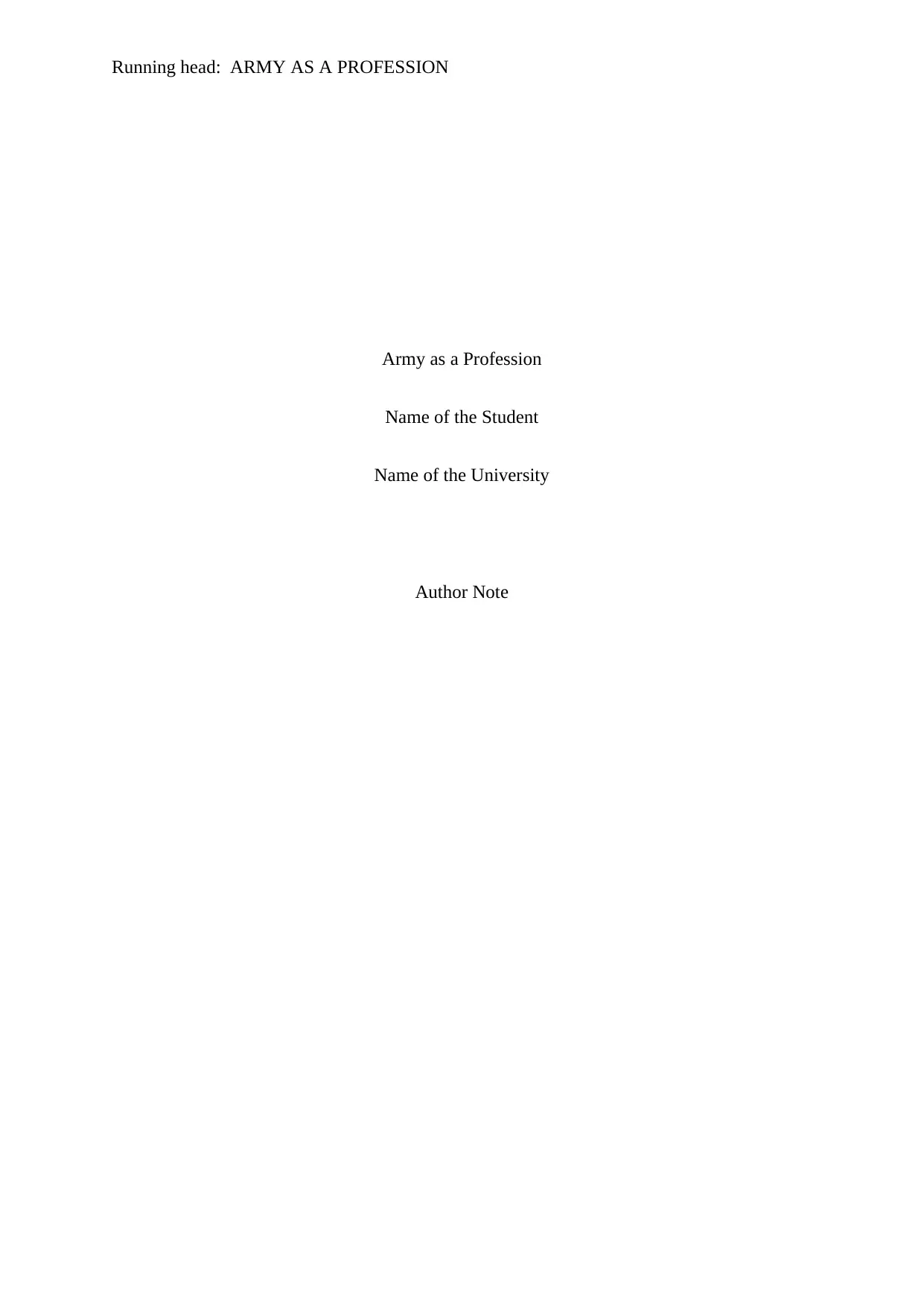
Running head: ARMY AS A PROFESSION
Army as a Profession
Name of the Student
Name of the University
Author Note
Army as a Profession
Name of the Student
Name of the University
Author Note
Paraphrase This Document
Need a fresh take? Get an instant paraphrase of this document with our AI Paraphraser
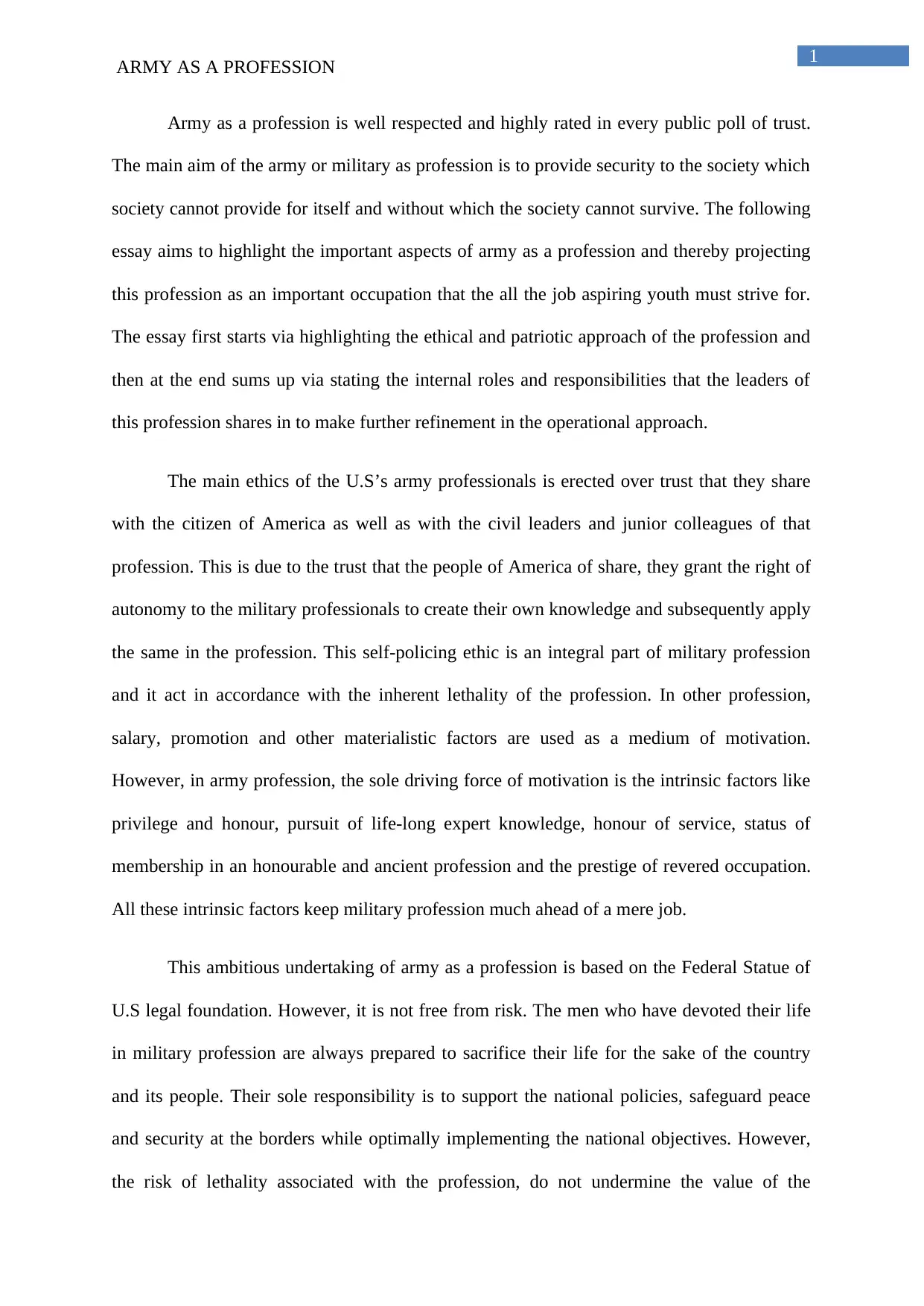
1
ARMY AS A PROFESSION
Army as a profession is well respected and highly rated in every public poll of trust.
The main aim of the army or military as profession is to provide security to the society which
society cannot provide for itself and without which the society cannot survive. The following
essay aims to highlight the important aspects of army as a profession and thereby projecting
this profession as an important occupation that the all the job aspiring youth must strive for.
The essay first starts via highlighting the ethical and patriotic approach of the profession and
then at the end sums up via stating the internal roles and responsibilities that the leaders of
this profession shares in to make further refinement in the operational approach.
The main ethics of the U.S’s army professionals is erected over trust that they share
with the citizen of America as well as with the civil leaders and junior colleagues of that
profession. This is due to the trust that the people of America of share, they grant the right of
autonomy to the military professionals to create their own knowledge and subsequently apply
the same in the profession. This self-policing ethic is an integral part of military profession
and it act in accordance with the inherent lethality of the profession. In other profession,
salary, promotion and other materialistic factors are used as a medium of motivation.
However, in army profession, the sole driving force of motivation is the intrinsic factors like
privilege and honour, pursuit of life-long expert knowledge, honour of service, status of
membership in an honourable and ancient profession and the prestige of revered occupation.
All these intrinsic factors keep military profession much ahead of a mere job.
This ambitious undertaking of army as a profession is based on the Federal Statue of
U.S legal foundation. However, it is not free from risk. The men who have devoted their life
in military profession are always prepared to sacrifice their life for the sake of the country
and its people. Their sole responsibility is to support the national policies, safeguard peace
and security at the borders while optimally implementing the national objectives. However,
the risk of lethality associated with the profession, do not undermine the value of the
ARMY AS A PROFESSION
Army as a profession is well respected and highly rated in every public poll of trust.
The main aim of the army or military as profession is to provide security to the society which
society cannot provide for itself and without which the society cannot survive. The following
essay aims to highlight the important aspects of army as a profession and thereby projecting
this profession as an important occupation that the all the job aspiring youth must strive for.
The essay first starts via highlighting the ethical and patriotic approach of the profession and
then at the end sums up via stating the internal roles and responsibilities that the leaders of
this profession shares in to make further refinement in the operational approach.
The main ethics of the U.S’s army professionals is erected over trust that they share
with the citizen of America as well as with the civil leaders and junior colleagues of that
profession. This is due to the trust that the people of America of share, they grant the right of
autonomy to the military professionals to create their own knowledge and subsequently apply
the same in the profession. This self-policing ethic is an integral part of military profession
and it act in accordance with the inherent lethality of the profession. In other profession,
salary, promotion and other materialistic factors are used as a medium of motivation.
However, in army profession, the sole driving force of motivation is the intrinsic factors like
privilege and honour, pursuit of life-long expert knowledge, honour of service, status of
membership in an honourable and ancient profession and the prestige of revered occupation.
All these intrinsic factors keep military profession much ahead of a mere job.
This ambitious undertaking of army as a profession is based on the Federal Statue of
U.S legal foundation. However, it is not free from risk. The men who have devoted their life
in military profession are always prepared to sacrifice their life for the sake of the country
and its people. Their sole responsibility is to support the national policies, safeguard peace
and security at the borders while optimally implementing the national objectives. However,
the risk of lethality associated with the profession, do not undermine the value of the
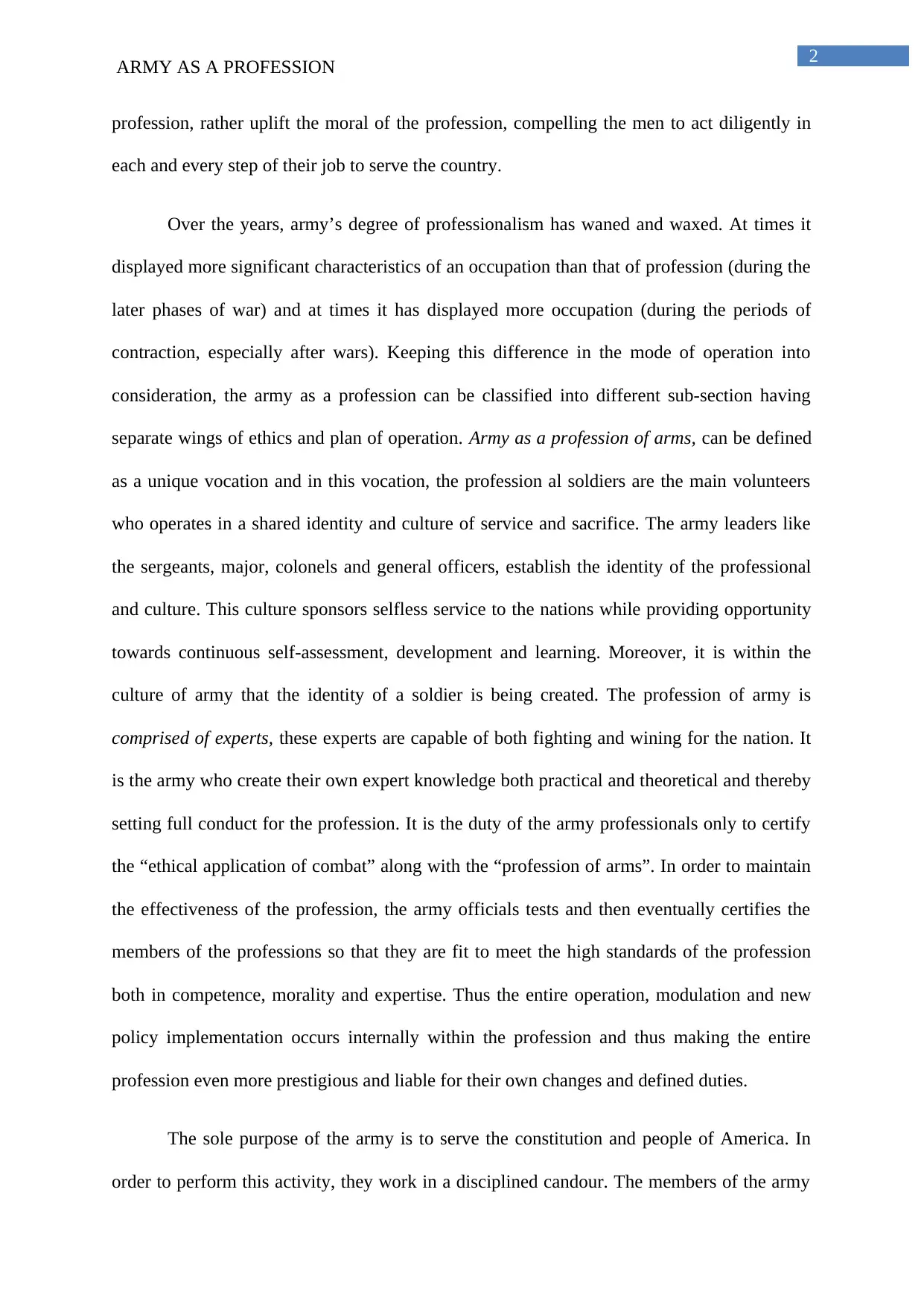
2
ARMY AS A PROFESSION
profession, rather uplift the moral of the profession, compelling the men to act diligently in
each and every step of their job to serve the country.
Over the years, army’s degree of professionalism has waned and waxed. At times it
displayed more significant characteristics of an occupation than that of profession (during the
later phases of war) and at times it has displayed more occupation (during the periods of
contraction, especially after wars). Keeping this difference in the mode of operation into
consideration, the army as a profession can be classified into different sub-section having
separate wings of ethics and plan of operation. Army as a profession of arms, can be defined
as a unique vocation and in this vocation, the profession al soldiers are the main volunteers
who operates in a shared identity and culture of service and sacrifice. The army leaders like
the sergeants, major, colonels and general officers, establish the identity of the professional
and culture. This culture sponsors selfless service to the nations while providing opportunity
towards continuous self-assessment, development and learning. Moreover, it is within the
culture of army that the identity of a soldier is being created. The profession of army is
comprised of experts, these experts are capable of both fighting and wining for the nation. It
is the army who create their own expert knowledge both practical and theoretical and thereby
setting full conduct for the profession. It is the duty of the army professionals only to certify
the “ethical application of combat” along with the “profession of arms”. In order to maintain
the effectiveness of the profession, the army officials tests and then eventually certifies the
members of the professions so that they are fit to meet the high standards of the profession
both in competence, morality and expertise. Thus the entire operation, modulation and new
policy implementation occurs internally within the profession and thus making the entire
profession even more prestigious and liable for their own changes and defined duties.
The sole purpose of the army is to serve the constitution and people of America. In
order to perform this activity, they work in a disciplined candour. The members of the army
ARMY AS A PROFESSION
profession, rather uplift the moral of the profession, compelling the men to act diligently in
each and every step of their job to serve the country.
Over the years, army’s degree of professionalism has waned and waxed. At times it
displayed more significant characteristics of an occupation than that of profession (during the
later phases of war) and at times it has displayed more occupation (during the periods of
contraction, especially after wars). Keeping this difference in the mode of operation into
consideration, the army as a profession can be classified into different sub-section having
separate wings of ethics and plan of operation. Army as a profession of arms, can be defined
as a unique vocation and in this vocation, the profession al soldiers are the main volunteers
who operates in a shared identity and culture of service and sacrifice. The army leaders like
the sergeants, major, colonels and general officers, establish the identity of the professional
and culture. This culture sponsors selfless service to the nations while providing opportunity
towards continuous self-assessment, development and learning. Moreover, it is within the
culture of army that the identity of a soldier is being created. The profession of army is
comprised of experts, these experts are capable of both fighting and wining for the nation. It
is the army who create their own expert knowledge both practical and theoretical and thereby
setting full conduct for the profession. It is the duty of the army professionals only to certify
the “ethical application of combat” along with the “profession of arms”. In order to maintain
the effectiveness of the profession, the army officials tests and then eventually certifies the
members of the professions so that they are fit to meet the high standards of the profession
both in competence, morality and expertise. Thus the entire operation, modulation and new
policy implementation occurs internally within the profession and thus making the entire
profession even more prestigious and liable for their own changes and defined duties.
The sole purpose of the army is to serve the constitution and people of America. In
order to perform this activity, they work in a disciplined candour. The members of the army
⊘ This is a preview!⊘
Do you want full access?
Subscribe today to unlock all pages.

Trusted by 1+ million students worldwide
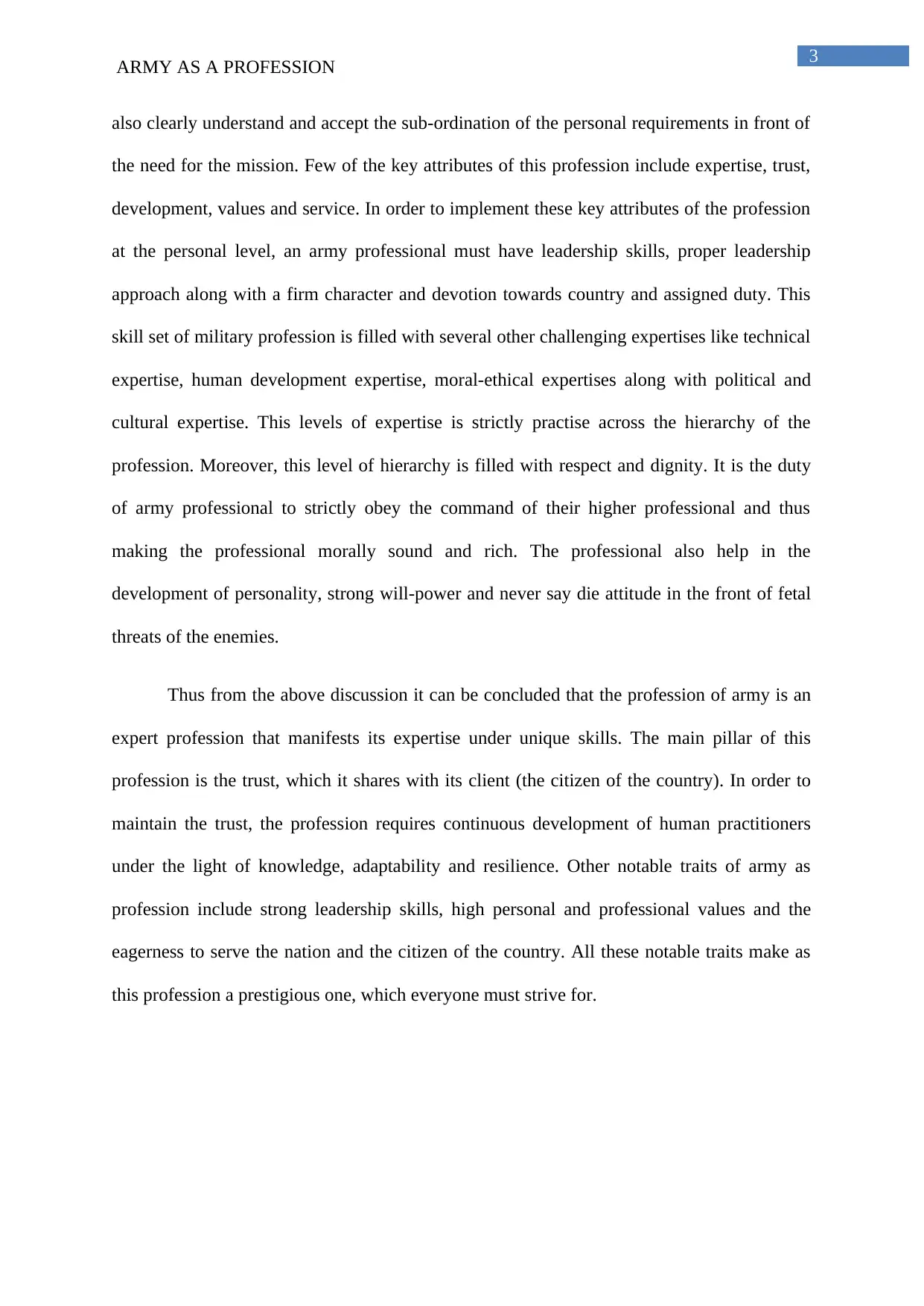
3
ARMY AS A PROFESSION
also clearly understand and accept the sub-ordination of the personal requirements in front of
the need for the mission. Few of the key attributes of this profession include expertise, trust,
development, values and service. In order to implement these key attributes of the profession
at the personal level, an army professional must have leadership skills, proper leadership
approach along with a firm character and devotion towards country and assigned duty. This
skill set of military profession is filled with several other challenging expertises like technical
expertise, human development expertise, moral-ethical expertises along with political and
cultural expertise. This levels of expertise is strictly practise across the hierarchy of the
profession. Moreover, this level of hierarchy is filled with respect and dignity. It is the duty
of army professional to strictly obey the command of their higher professional and thus
making the professional morally sound and rich. The professional also help in the
development of personality, strong will-power and never say die attitude in the front of fetal
threats of the enemies.
Thus from the above discussion it can be concluded that the profession of army is an
expert profession that manifests its expertise under unique skills. The main pillar of this
profession is the trust, which it shares with its client (the citizen of the country). In order to
maintain the trust, the profession requires continuous development of human practitioners
under the light of knowledge, adaptability and resilience. Other notable traits of army as
profession include strong leadership skills, high personal and professional values and the
eagerness to serve the nation and the citizen of the country. All these notable traits make as
this profession a prestigious one, which everyone must strive for.
ARMY AS A PROFESSION
also clearly understand and accept the sub-ordination of the personal requirements in front of
the need for the mission. Few of the key attributes of this profession include expertise, trust,
development, values and service. In order to implement these key attributes of the profession
at the personal level, an army professional must have leadership skills, proper leadership
approach along with a firm character and devotion towards country and assigned duty. This
skill set of military profession is filled with several other challenging expertises like technical
expertise, human development expertise, moral-ethical expertises along with political and
cultural expertise. This levels of expertise is strictly practise across the hierarchy of the
profession. Moreover, this level of hierarchy is filled with respect and dignity. It is the duty
of army professional to strictly obey the command of their higher professional and thus
making the professional morally sound and rich. The professional also help in the
development of personality, strong will-power and never say die attitude in the front of fetal
threats of the enemies.
Thus from the above discussion it can be concluded that the profession of army is an
expert profession that manifests its expertise under unique skills. The main pillar of this
profession is the trust, which it shares with its client (the citizen of the country). In order to
maintain the trust, the profession requires continuous development of human practitioners
under the light of knowledge, adaptability and resilience. Other notable traits of army as
profession include strong leadership skills, high personal and professional values and the
eagerness to serve the nation and the citizen of the country. All these notable traits make as
this profession a prestigious one, which everyone must strive for.
Paraphrase This Document
Need a fresh take? Get an instant paraphrase of this document with our AI Paraphraser
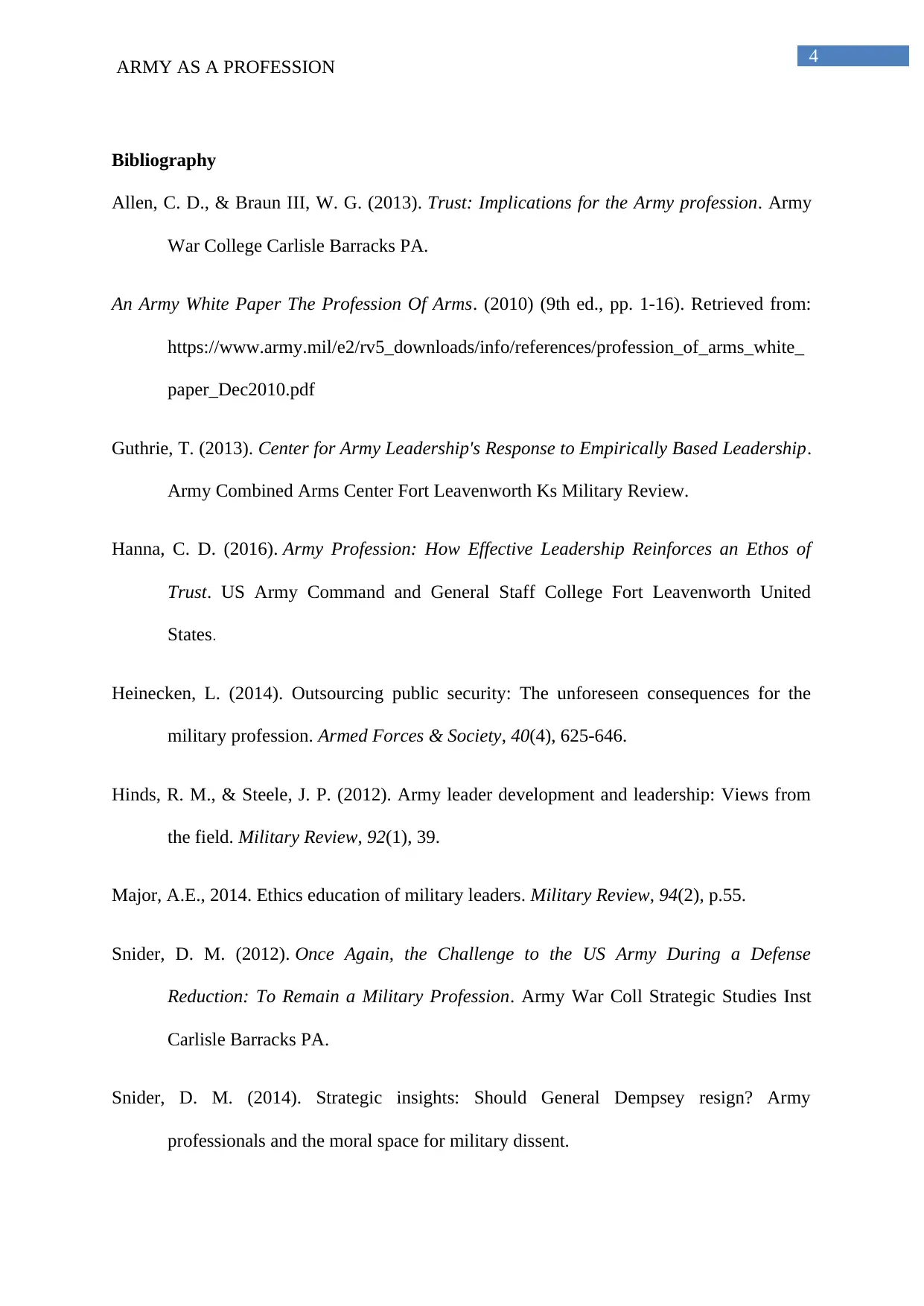
4
ARMY AS A PROFESSION
Bibliography
Allen, C. D., & Braun III, W. G. (2013). Trust: Implications for the Army profession. Army
War College Carlisle Barracks PA.
An Army White Paper The Profession Of Arms. (2010) (9th ed., pp. 1-16). Retrieved from:
https://www.army.mil/e2/rv5_downloads/info/references/profession_of_arms_white_
paper_Dec2010.pdf
Guthrie, T. (2013). Center for Army Leadership's Response to Empirically Based Leadership.
Army Combined Arms Center Fort Leavenworth Ks Military Review.
Hanna, C. D. (2016). Army Profession: How Effective Leadership Reinforces an Ethos of
Trust. US Army Command and General Staff College Fort Leavenworth United
States.
Heinecken, L. (2014). Outsourcing public security: The unforeseen consequences for the
military profession. Armed Forces & Society, 40(4), 625-646.
Hinds, R. M., & Steele, J. P. (2012). Army leader development and leadership: Views from
the field. Military Review, 92(1), 39.
Major, A.E., 2014. Ethics education of military leaders. Military Review, 94(2), p.55.
Snider, D. M. (2012). Once Again, the Challenge to the US Army During a Defense
Reduction: To Remain a Military Profession. Army War Coll Strategic Studies Inst
Carlisle Barracks PA.
Snider, D. M. (2014). Strategic insights: Should General Dempsey resign? Army
professionals and the moral space for military dissent.
ARMY AS A PROFESSION
Bibliography
Allen, C. D., & Braun III, W. G. (2013). Trust: Implications for the Army profession. Army
War College Carlisle Barracks PA.
An Army White Paper The Profession Of Arms. (2010) (9th ed., pp. 1-16). Retrieved from:
https://www.army.mil/e2/rv5_downloads/info/references/profession_of_arms_white_
paper_Dec2010.pdf
Guthrie, T. (2013). Center for Army Leadership's Response to Empirically Based Leadership.
Army Combined Arms Center Fort Leavenworth Ks Military Review.
Hanna, C. D. (2016). Army Profession: How Effective Leadership Reinforces an Ethos of
Trust. US Army Command and General Staff College Fort Leavenworth United
States.
Heinecken, L. (2014). Outsourcing public security: The unforeseen consequences for the
military profession. Armed Forces & Society, 40(4), 625-646.
Hinds, R. M., & Steele, J. P. (2012). Army leader development and leadership: Views from
the field. Military Review, 92(1), 39.
Major, A.E., 2014. Ethics education of military leaders. Military Review, 94(2), p.55.
Snider, D. M. (2012). Once Again, the Challenge to the US Army During a Defense
Reduction: To Remain a Military Profession. Army War Coll Strategic Studies Inst
Carlisle Barracks PA.
Snider, D. M. (2014). Strategic insights: Should General Dempsey resign? Army
professionals and the moral space for military dissent.
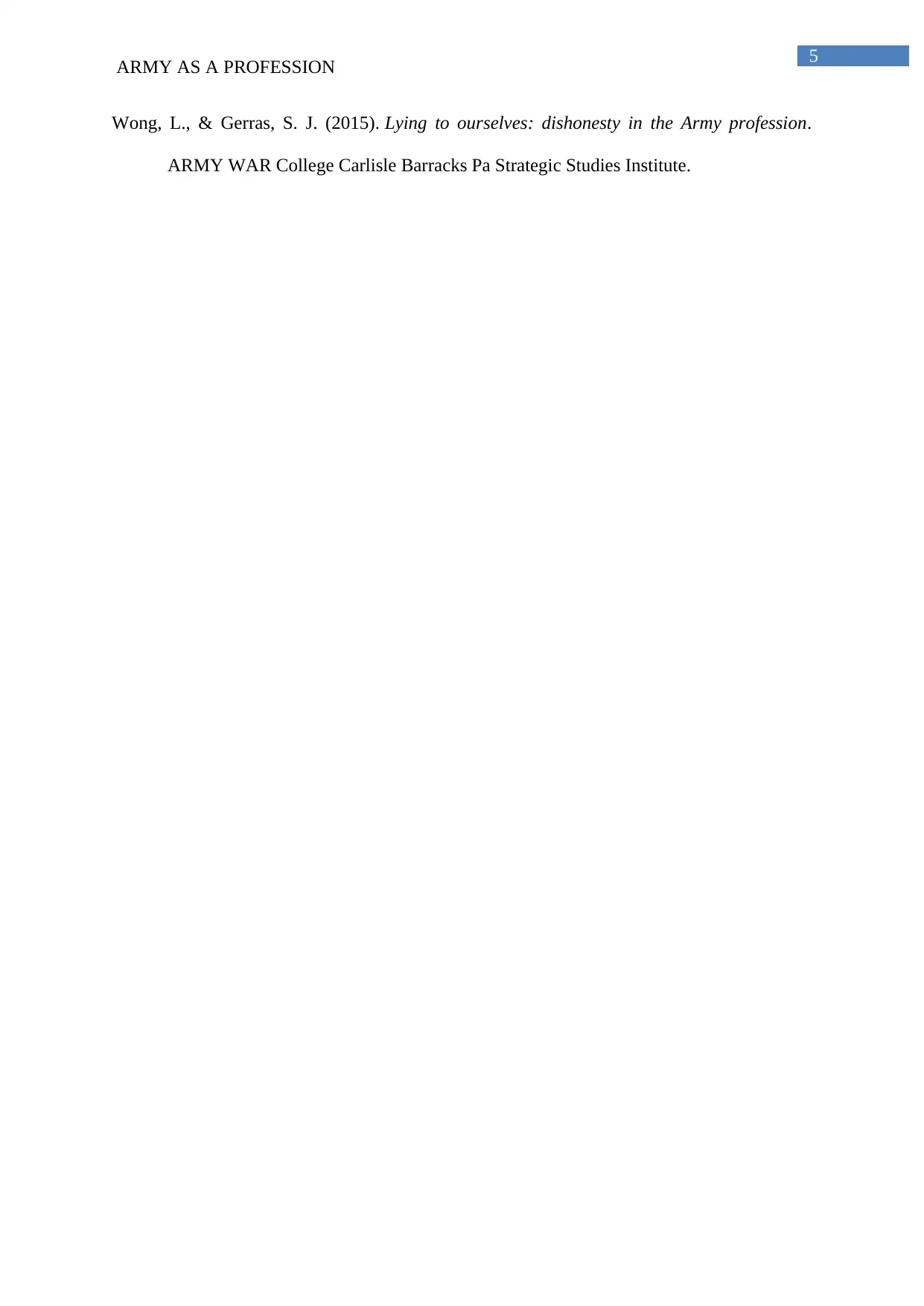
5
ARMY AS A PROFESSION
Wong, L., & Gerras, S. J. (2015). Lying to ourselves: dishonesty in the Army profession.
ARMY WAR College Carlisle Barracks Pa Strategic Studies Institute.
ARMY AS A PROFESSION
Wong, L., & Gerras, S. J. (2015). Lying to ourselves: dishonesty in the Army profession.
ARMY WAR College Carlisle Barracks Pa Strategic Studies Institute.
⊘ This is a preview!⊘
Do you want full access?
Subscribe today to unlock all pages.

Trusted by 1+ million students worldwide
1 out of 6
Your All-in-One AI-Powered Toolkit for Academic Success.
+13062052269
info@desklib.com
Available 24*7 on WhatsApp / Email
![[object Object]](/_next/static/media/star-bottom.7253800d.svg)
Unlock your academic potential
Copyright © 2020–2026 A2Z Services. All Rights Reserved. Developed and managed by ZUCOL.

